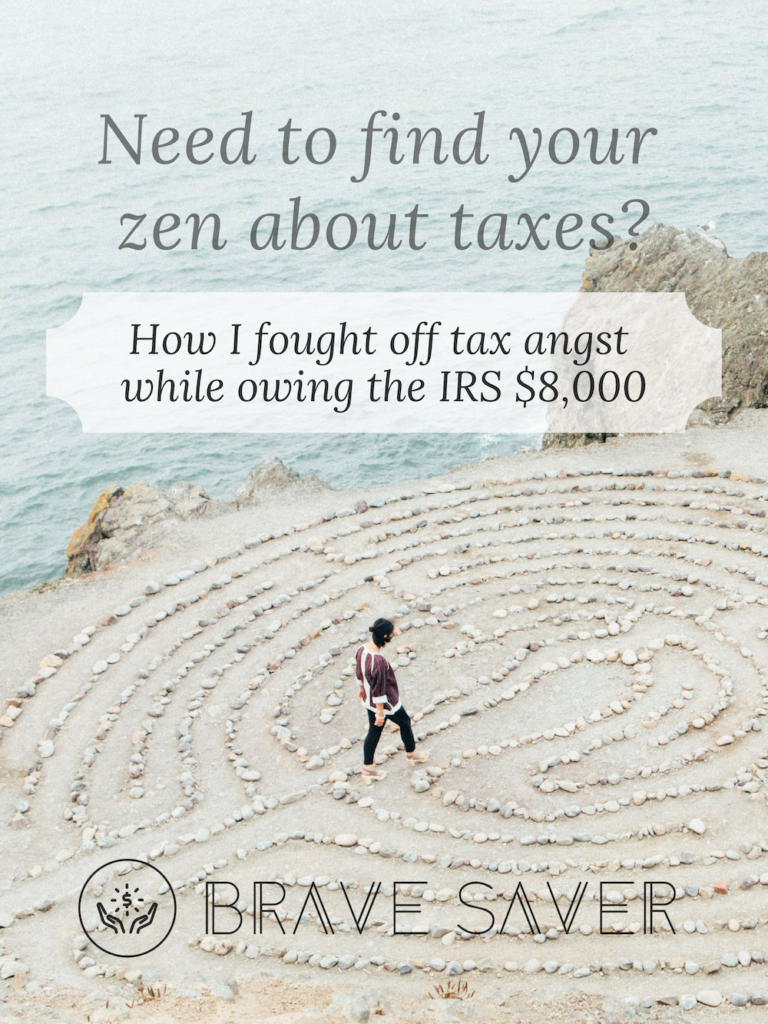
“Um, so, don’t freak out but I think we might owe like… $10,000 in taxes this year?”
Surrounded by W-2s, 1098s, and myriad other tax documents, I texted this worry to my husband.
We knew 2018 would be an unusual tax year for us (thanks to a surprise bonus I’d received) — we’d even tallied up and estimated our taxes owed at the end of the year. But glancing over the numbers as I gathered our tax forms, my quick math seemed to put us short of our estimate by about $10,000.
I feverishly double- and triple-checked my math. Finally, I spotted the error I hoped to find: I’d totaled federal taxes only, overlooking state and payroll taxes we’d counted in our previous estimate. I sighed in relief and texted an update: with everything included, we were about on target.
What's in this post
Flashbacks to our $8,100 tax bill
This recent panic sweat had me flashing back to the fateful tax season we owed a sky-high $8,100.
Our $8,100 tax bill was 75% a surprise. We expected to owe a bit that year, thanks to a freelance gig my husband had completed. We eyeballed our outstanding tax bill at $2,000.
But when all was said and done, our tax debt ended up being four times that.
The surprise $6,000 in owed taxes hurt like a mother. Our saving grace was our diligent efforts to build an emergency fund the year before — instead of spending those “extra” funds, we’d set them aside.
So it was simple, as a matter of
What was a lot less simple was dealing with the emotional storm this tax bill provoked.
More surprising than my tax bill? How much I resented it
Our tax bill hit me hard, and I didn’t deal with it well.
My annoyance, angst, and anger over that “lost” money
Intellectually, I knew this money was technically never mine to begin with.
Emotionally? I was completely attached to it.
It was like the IRS had ripped away my financial security blanket, and I suddenly felt very exposed.
I actually felt kind of robbed. It scared me to see my savings account balance crash down by $8,100, and it stirred up a whirl of money fears and worries.
How I worked through my taxpayers’ angst
As weeks passed, my tax issues went from grumpy complaints to a major grudge. I was so hung up over that $8,000 that it was making me unhappy and turning me into someone I didn’t like.
Still, I knew that no amount of complaining, kvetching or pouting about my tax bill would change the facts. The only thing left to change was how I felt about and viewed the situation.
I’d settled my tax bill, and now I needed to work on settling down my taxpayers’ angst.
I validated my angst over taxes
The push and pull between taxes as necessary for functional societies and also burdensome to individuals — it’s an age-old struggle. And people have been mad about their taxes the whole damn time, even to the point of starting wars and revolutions over them!
So was it really that crazy that I’d feel grumpy about paying $8,000 in taxes all at once? (NO.)
Being more honest with myself about how bothered I truly was opened up my awareness on the subject. Acknowledging and validating that I was pissed about paying taxes — and that this was a
I accepted the situation and adjusted my attitude
At a past job, I had an hour-long commute each way. When I’d hit a traffic jam, the long minutes of stop-and-start traffic left me stewing in a bath of stress hormones.
I was doing just that one day when clarity hit me.
Getting worked up and mad did nothing to change my situation or resolve it faster.
All it did was make something admittedly unpleasant into a personal agony.
When owing this tax bill hit a lot of my same emotional buttons, I knew I’d been here before — stuck in a situation I intensely disliked and couldn’t change.
Which meant I already had skills and strategies in place to work through it.
So I practiced it: each time I thought of my tax bill, I’d push back on automatic judgments: “It’s not fair!” “I hate this,” “This set our savings back so much.” I’d try to
I figured out exactly what went wrong
Unlike being stuck in traffic, however, my tax bill was a situation I had every ability to predict, plan for, and prevent. Which brought me to the next step: figuring out exactly what the hell we did wrong.
Because I didn’t know how I landed myself with a tax bill, I couldn’t (or wouldn’t) take responsibility for it.
I felt like I was at mercy of a big, scary tax code that I couldn’t possibly understand and that could change at any moment to mess with my money.
The previous year had brought a lot of new things: new baby, new jobs, new freelance opportunities. But we didn’t consider how all of that affected our taxes.
As a result, we borked up our W-4s big time.
We both claimed a withholding allowance for our daughter, and both claimed to be the heads of our household. (Spoiler: that’s not how it works on taxes.) It was just a complete failure to plan for taxes that year, despite some major life changes.
After reviewing the evidence, I quickly saw that my unease with taxes was just a symptom of my ignorance.
With a more concrete understanding of how our taxes worked, I stopped feeling like such a victim. Instead, I felt empowered with new knowledge about how to handle our taxes more wisely in the future.
I reframed taxes as something I get to pay
Cooling down my heated feelings about taxes allowed me to consider: was it possible to gladly pay taxes?
Instead of getting hung up on the “I have to” of taxes, maybe I could shift to thinking how “I get to” pay taxes.
- I get to contribute to society through my taxes.
- I get to vote and engage in democracy to ensure my taxes are used to supporting others
in efficient , meaningful ways. - I get to live in a nation that has safety nets in place for people who need them — including me, who’d claimed paid family leave benefits just the year before.
- I get to enjoy many, many personal public services and privileges as a citizen of this country.
- I get to do my part to pay into and support these services.
- I get to earn enough money to owe taxes in the first place.
As I tried on this view of my taxes, it resonated with one of my core values: contribution. It’s always been important to me to do my part, make sure I’m contributing and carrying my part of the load (whether I live up to that or now). Instead of having to pay taxes, I viewed it as a way I get to live out this value, to contribute and re-invest resources into my communities.
The pain of paying taxes isn’t totally gone. I still felt the twinge looking at our total taxes owed this year. But now I can more easily let that frustration come and go. And I continue to choose to view paying taxes as one of the personal contributions to society that I’m proud to make.
This year, I wound up owing $1,100 in state and federal taxes. And I get to pay it, drama-free.

Photo by Ashley Batz on Unsplash




4 Comments
Regina Iulo
April 16, 2019 at 12:00 pmThoughtful and valid. I’m on board with you.
Savvy History
April 28, 2019 at 1:29 amLast year we were nailed with $2,000. We had both filed zero and everything. It was my side-hustle money from guitar lessons and music shows! It was such a shocker. While a lot less than your scenario, I can totally relate.
Abigail @ipickuppennies
October 11, 2019 at 7:07 pmouch! I don’t think I’d handle that tax bill well either. And I’m all for contributing to society and being there for the less fortunate but… Wow $8,000?
I was completely off what I’d owe last year because I was single but that meant I overpaid. Getting the money back — my money — made me irrationally happy and I had to keep reminding myself that it was money that should’ve been in my account all along, not free money. This year I’m hoping to get a much smaller refund because I changed my taxes based on what I owed last year. So at worst whatever I owe or get back should be under $500, which Is all that I ask, really.
Elyssa Kirkham
October 16, 2019 at 6:29 pmIt was a first for me, and I vowed it would be my last! It was really, really rough. As I said… I owed that $8,000 whether I liked it or not. It kind of wasn’t my money to begin with, either.